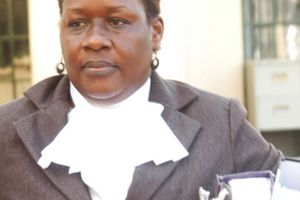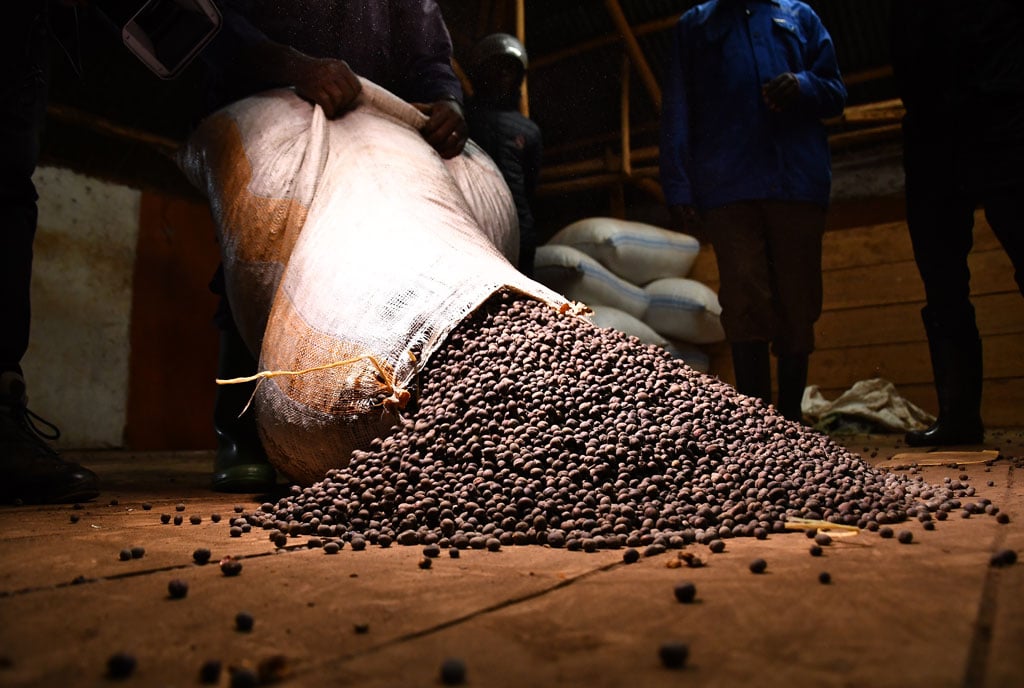
Police forensic team at the scene of Senior Principal State Attorney Joan Kagezi’s killing in Kampala in 2015. PHOTO/ FILE
Crime has an uncanny way of repeating itself. Twenty-six years after Androa Asenua was found guilty in the 1993 murder of Prof Dan Mudhola and Dr Dan Kidubuka, the suspects in the 2015 murder of Joan Kagezi, one of the country’s top prosecutors, falsely believed that the apparitions, which haunted them, could be exorcised by a witchdoctor if they offered a sacrifice on the ‘venerated’ grounds of the shrine. But inside the cloistered walls, they acted impulsively and confessed to committing these murders.
Asenua was found guilty by the highest appellate court in 1998 after he was heard confessing to a witchdoctor that he had killed Mudhola and sought medicine to be protected against arrest. The Justices of the Supreme Court who heard the appeal in the Festo Androa Asenua and Kakooza Joseph Denis Vs Uganda case examined the principles of a confession, which connotes “an unequivocal admission of having committed an act which in law amounts to a crime and the circumstantial evidence, to reach the logical conclusion that there was no other reasonable inference except that the first appellant, Asenua, killed Mudhola.”
Whereas it is not yet clear when the High Court will commence the trial of suspects accused of assassinating Kagezi, some of the details of the evidence in the committal proceedings reveal a futile attempt by criminals to seek the protective armour of witchdoctors. Kagezi was on March 30, 2015 killed by a gunman’s bullet while in a pick-up truck with her three children. She had earlier in 2015 been appointed to head the International Crimes Division, at the rank of Assistant Director of Public Prosecutions.
She was also the lead prosecutor in the trial of those implicated in the July 11, 2010, bomb attacks that left more than 80 people dead in Kampala.
Telltale sign
Whereas it has taken some time to identify the killers, there is hope that the wheels of justice, which turn slowly, will grind exceedingly fine.
“The Joan Kagezi case was committed to the High Court, International Crimes Division, for trial in March 2024. The case will be heard when the matter is fixed for hearing by the court,” Ms Jacquelyn Okui, the spokesperson of the office of the Directorate of Public Prosecutions (DPP), told Sunday Monitor. She added: “The prosecution will rely on both direct and circumstantial evidence which we have disclosed in the indictment but cannot discuss in the public domain because the matter is for adjudication by the court.”

Police stand guard at the scene where acting Assistant Director of Public Prosecution Joan Kagezi was shot dead in Kampala, on March 31, 2015. Ms Kagezi, who was handling the trial of 13 men accused of participating in 2010 Al-Shabaab bombings that killed 76 people, was shot by two assailants who had been trailing her on a motorcycle. PHOTO/ FILE
In March, it was revealed in the summary of evidence submitted by assistant DPP Thomas Jatiko, during the committal proceedings at the Nakawa Chief Magistrate’s Court, that the four suspects involved in the murder visited a witchdoctor in Kayunga District where they reportedly performed rituals to be able to evade arrest.
The suspects include Daniel Kisekka Kiwanuka, a peasant farmer and charcoal burner residing in Nsanvu Village, Kitimbwa Town Council, Kayunga District; John Kibuuka, an inmate at Kigo prison; Nasur Abdallah Mugonole and John Masajjage, both inmates at Kitalya prison in Wakiso District.
According to the prosecution, which appeared before the Chief Magistrate, Erias Kakooza, the plot to kill Kagezi was hatched in the neighbouring Democratic Republic of Congo (DRC), where both the funding and guns came from. One of the suspects confessed that they had been paid a deposit to execute the murder and they were demanding the balance. According to the evidence, “A3 [Masagajje] complained that the deposit of the money he got was spent on a witchdoctor to tie [sic] the case. Those who A3 revealed this information to will be called to testify as witnesses during the trial.”
Busted
According to the evidence adduced during the committal proceedings, Masagajje fled his home and moved to Buvuma islands, where he took on menial jobs, including working as a cobbler and as a boda boda cyclist, to avoid detection and was known by the nom de guerre of Brian Mubiru. In 2023, he was arrested in Wandegeya, Kampala, while riding a motorcycle.
Detectives discovered that Kibuuka and Munogole were convicts who had been imprisoned for other capital offences after the murder of Kagezi.
Kisekka, an army deserter, who reportedly escaped with two guns and bullets, had staged several aggravated robberies but had left prison and relocated to the quiet hamlet in Kayunga. He was later rearrested in Luweero, in October 2023, in connection with a case of theft of property, and while in custody, it was discovered that he was a suspect in the murder of Kagezi.
Kisekka reportedly confessed to the murder and revealed that the guns were brought by Kibuuka, who paid each one of them Shs500,000.
“He informed the investigators that after the murder, he fired one shot in the air to clear the way and both teams successfully escaped and returned to their hideouts in Nabweru,” it was revealed at the committal proceedings.
Afterward, the suspects fled to a witchdoctor in Kayunga to perform rituals. The witchdoctor, who performed the rituals, and has been on remand for committing another offence, confessed to the investigators that he met the suspects in his shrine and was able to identify them at an identification parade.
The evidence in Kagezi’s murder shares similarities with the murder of Prof Dan Mudhola, who at the time of his death on February 21, 1993, deputised the former Chief Justice, Benjamin Odoki, who chaired the Constitutional Review Commission (CRC). Mudhoola was killed alongside his friend, Dr Francis Kiduubuka, at a bar in Wandegeya, Kampala, when a grenade struck the area where they were seated. Their colleague, Prof James Katorobo, survived with injuries.
According to the appeal filed before the Supreme Court in the case of Festo Androa Asenua and another Vs Uganda, before the coram consisting of Justices, Arthur Oder, Wilson Tsekooko, Joseph Mulenga, and Laetitia Mukasa-Kikonyogo, it was heard that “on or about February 15, 1993, the first appellant sought protection from a medicine-man called Ali of Geregere Village, Lugazi, where he [Ali] had a wife called Jane Nakate [PW16], a matooke dealer. Ali rented a room there, which served as his clinic or shrine.”
Asenua was found guilty of the murder and his prosecution was based on his confession and the circumstantial evidence, which drew a reasonable inference regarding the rituals that Ansenua performed.
Court, in 1998, heard that the first appellant informed Ali in the presence of Jane Nakate that he wanted to kill Mudhola. He, therefore, wanted medicine to protect himself. After hearing that declaration, Nakate moved away from Ali's shrine and did not hear the rest of the conversation.
“On the instructions of Capt Kaaya and a Lt Annet, the second appellant drove the first appellant [Asenua], who carried a grenade in a bag, to the place where the deceased were drinking.
At about 8pm, the first appellant released the grenade at the place where the deceased were drinking. The grenade exploded, very seriously injuring the two [Mudhola, Kidubuka] deceased and other people who were rushed to Mulago Hospital where they died the following day, February 21, 1993.”

Murdered: Joan Kagezi
Prosecution revealed that “a few days thereafter, Jane Nakate [PW16] again saw the first appellant [Ansenua] at her husband's [Ali's] home. There, Jane Nakate heard the first appellant tell her husband that "he had killed Mudhola but wanted medicine to protect him against arrest". It would seem that on the same day or later, the first appellant organised feasting, i.e., drinking and eating.”
Ali, who never testified during the trial, reported the first appellant to military authorities in Entebbe, who, together with the police, eventually arrested the first appellant, Asenua at Lugazi at the grave of a relative while cleansing himself, in the manner prescribed by Ali, ‘to appease the ghosts of Mudhola and Kidubuka’.” The first appellant was eventually taken to court where he was charged with the murders of the two deceased persons and the attempted murder of Prof Katorobo.
Asenua alibi
The second appellant, Dennis Joseph Kakooza, was arrested in 1992 for theft. In December 1992, the second appellant escaped from prison where he had been detained on a charge of theft of a bicycle. He was rearrested on April 13, 1993. The murder of the duo appears to have haunted him while he was in custody, reads the judgement. He spoke to a police officer and the second appellant was later taken to Andrew Bashaija, a Magistrate Grade 1, who, on May 5, 1993, recorded a confession statement from the second appellant.
In his defence on oath, the first appellant, Asenua, testified that on February 20, 1993, on the night the deceased persons were fatally injured at Wandegeya by the blast of the grenade, he was at the funeral rites ceremony at the home of James Machyo, who also testified in his support as a defence witness. This alibi was not raised before trial and was raised belatedly in 1996. Justice Oder relied on the 1939 decision of Wazir Singh and others at the East African Court of Appeal where he observed that "if a person is accused of anything and his defence is an alibi, he should bring forward that alibi as soon as he can because, firstly, if he does not bring it forward until months afterward, there is naturally a doubt as to whether he has not been preparing it in the interval, and secondly, if he brings it forward at the earliest possible moment, it will give the prosecution an opportunity of inquiring into that alibi and if they are satisfied as to its genuineness, proceedings will be stopped.”








